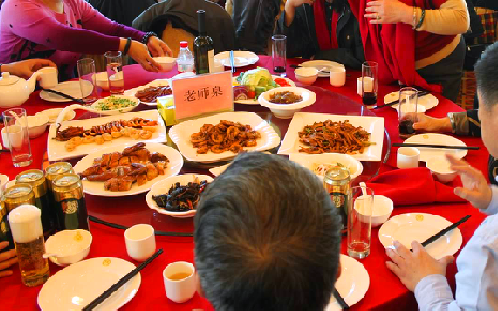20 Pro Pieces Of Advice To Explore China Rich Food History
Wiki Article
Top 10 Shopping Tips In China's Street Markets
1. Get there early. Market vendors will offer better bargains to their first customers if they arrive in the market earlier.Pros: Buying early will give you more choices and more bargaining power.Con: It requires waking up extremely early. This might not be a good fit for every person's schedule.
2. Bring CashTip: Most street market vendors prefer cash, although mobile payment options such as WeChat Pay or Alipay are increasing in popularity.Cash payments can facilitate transactions and provide you with an advantage in negotiations.Con: Carrying large sums of cash in places that are crowded increases the risk of theft or loss.
3. Learn Basic MandarinTip: Knowing phrases like "Zhege duoshao Qian?" (How much is this?) or "Pianyi yidian ba" (Can you reduce the cost?) Effective communication is a must for communication.Pro: Shows respect for the local culture and helps build relationships with vendors.Con: The limited vocabulary can lead to confusion.
4. Inspection of GoodsTip: Check items carefully for any defects or inconsistent items, especially clothing, electronics, and handicrafts.Pro: Ensures you get what you're paying for and helps avoid disappointment later.Cons: Time-consuming and vendors can become annoyed.
5. Bargain ConfidentlyIn most street markets there is a tendency to haggle. You should aim to reduce the cost by 50-70% at first.Pro: Bargaining can significantly cut cost.Cons: It's difficult for those not experienced with the process.
6. Beware of counterfeitsYou must be careful when purchasing brand-name items such as watches, bags and electronic devices.Pro: It can save you money by not buying counterfeits of poor quality.Pro: Genuine products are difficult to locate and can be more costly.
7. Respect Local CustomsTip: Adapt your approach by observing how locals interact shop, and bargain with vendors.You'll be able blend seamlessly and avoid errors.Pro: Can take some time to grasp the what is expected of you.
8. Keep Valuables SecureTip - Use anti theft bags or secure your phones and wallets in pockets to avoid being picked up in the market.Pro: Reduces the risk of theft in high-traffic areas.Cons: Additional precautions can be uncomfortable and unwieldy.
9. If you are buying food, try it before you buy.Benefit from the fact that many food stores will allow you to try snacks or dried products before buying the items.Pros: The food is sure to be fresh and delicious.Pro: Some sellers may insist on buying after they have provided a trial.
10. Know the market's focusYou can find certain items at each market, such as souvenirs and antiques at Beijing's Panjiayuan or Shanghai's Yuyuan Market. Before you go do some research on what you would like to buy.Saving time and narrowing focus.Cons: It limits spontaneity to the extent that you must stick to the facts you have researched.
The Pros of Shopping Street MarketsUnique Finds - You can find items in stores that aren't available anywhere else like local snacks and hand-crafted craft items.Street markets are usually less expensive than shopping malls or other shops.Cultural Experience: Engaging with vendors and exploring markets can be a fascinating way to learn about the local culture.One single market could offer everything, from clothing and food items to souvenirs.Pros and cons of shopping in market stalls on the streetsCounterfeit goods: There is a chance of locating fake or inferior products.The crowds at markets can be super busy during weekends or during holidays.Vendors could push sales strategies. This could make the experience seem overwhelming.Most purchases can't be returned.The following tips will assist you in avoiding the most common pitfalls and help you get the most of China's street markets. See the top rated tasty delights from China for website advice including a guide to China food scene, culinary wonders of China, Chinese cuisine you need to try, savor China regional food specialties, authentic tastes of China, experience traditional Chinese food, culinary wonders of China, explore diverse Chinese dishes, discover China culinary delights, top Chinese food experiences and more.

Top 10 Tips For Visiting Famous Temples During The Seasonal Visits In China
1. Visit in Off-Season(Autumn/Winter).Tip. Consider visiting the famous Chinese temples during times in cooler weather (usually from November through February). It is the time when fewer visitors are visiting, and the weather is cooler.
Pro The experience is more busy and more quiet.Con: The temperature could be cooler, which can make outdoor temple tours uncomfortable.2. Be prepared for extreme weatherTip: Temperatures can differ greatly during different seasons. The summer can be hot and humid, while winters can often be freezing. Pack for the weather.
Pro: Having prepared for any weather situation You'll be comfortable during your visit.Con: Packing to accommodate seasonal extremes is inconvenient If you're traveling light.3. Visits in Spring and the Summertime to view Vibrant FloraA tip: Visiting temples in the spring and summer months allows you to take in beautiful gardens, blooming flowers and lush landscapes surrounding the temples.
Pros: Beautiful landscapes add to the overall experience of visiting the temple grounds.Con summers can be very hot and crowded during holidays, especially the national ones.4. Think about festivals and other special events.Tip: Plan a visit around traditional festivals that are celebrated, like the Chinese New Year in January/February or the Mid-Autumn Festival in September. This is the most ideal time to visit a temple because it offers particular rituals and celebrations.
Pro Temples are awash with traditions and exciting occasions. They offer a unique experience.Con: Temples tend to be extremely busy, and hotel prices can rise during festival season.5. Avoid the Peak Holiday SeasonsTips Refrain from visiting temples during the peak tourist seasons, such as Chinese New Year and Golden Week (October), which are often crowded by both local and foreign tourists.
Pros: Relaxed visits with no crowds. Provides a spiritual experience.Con: You may not be able to attend some of the most exciting festival events when they are at their best.6. Check Temple Closures during WinterTips: Some temples might have limited hours, or even be closed during winter's colder months, particularly in more remote regions or in northern areas. Make sure you check prior to your trip.
Benefits: Avoids unnecessary trips and lets you plan other activities ahead of time.Con: A lot of temples are closed or reduced in hours for renovations. This can lead to disappointment.7. Early Morning Visits to the Beach in the SummerStart your journey early in the morning If you're visiting during summer to avoid the intense heat of midday. Most temples opened early in the morning. It is quieter and there are fewer visitors.
Benefits: Enjoy a cooler, quieter environment without the noise of.Con: Requires an early morning, which may not be convenient for everyone.8. Be Prepared for Rain in Summer.It is possible to experience heavy rain in the summer months, especially in the southern region of China. Take rain gear with you or an umbrella for trips in the summer.
Pros: Even in the rain, you are able to take in the beauty of the temple.Con: Rain can disrupt outdoor activities or make the grounds of temples slippery.9. Visit Mountain Temples during AutumnTips: Autumn is an perfect time to visit temples in the mountainous regions (e.g., Mount Wutai or Mount Emei) as the temperature is mild, and the fall foliage creates stunning scenery.
Pros A cool climate allows to enjoy more comfort while walking or hiking and also allow for stunning views.Con The mountain temples that are well-known can still attract crowds, particularly during holidays or weekends.10. Take a look at the Lunar Calendar in Specific CasesTips Many temples, particularly in China, follow the lunar calendar. This means that some ceremonies and events have a lunar date. It is essential to keep track of the calendar so that you can be able to attend important events, such as the Lantern Festival, Buddha’s Birthday or other temple celebrations.
Pro: Unique cultural experiences and deeper insights into the local practices of spirituality.Cons: It may require more planning and time to align your travel dates with the lunar calendar.Pros of Seasonal Visits to Chinese TemplesFewer crowds during off-season excursions are more peaceful and reflective.Cultural events: These festivals provide a deeper understanding of the local religious and culture practices.Scenic Beauty. In the spring or autumn, you will provide stunning scenery. The lush gardens that surround temples are also a great alternative.Cooler weather: The autumn and the winter are the best times to visit temples.Pros and Cons of Seasonal Chinese Temples VisitsUnpredictable Climate: Winters could be cold or summers too hot.Temple Closures - Some temples will close during extreme weather, or when they operate with restricted hours.Afraid of crowds during festivals: The most popular holidays and festivals can bring huge crowds, making it difficult to fully appreciate the peaceful atmosphere of the temple.Limited Events: If you're traveling outside of the season, some seasonal events might not be happening.If you schedule your trip in accordance with the season, it will make for an unforgettable and enjoyable experience. Whether you're looking for peaceful solitude or cultural festivities, understanding the seasonal dynamics can help you make the most of your trip. Follow the top explore local Chinese cuisine for blog examples including tasty delights from China, the best food destinations in China, culinary wonders of China, famous foods in China cities, China food heritage revealed, savor the flavors of China, culinary wonders of China, explore China food scene, discover hidden food gems in China, delicious Chinese dishes to try and more.
